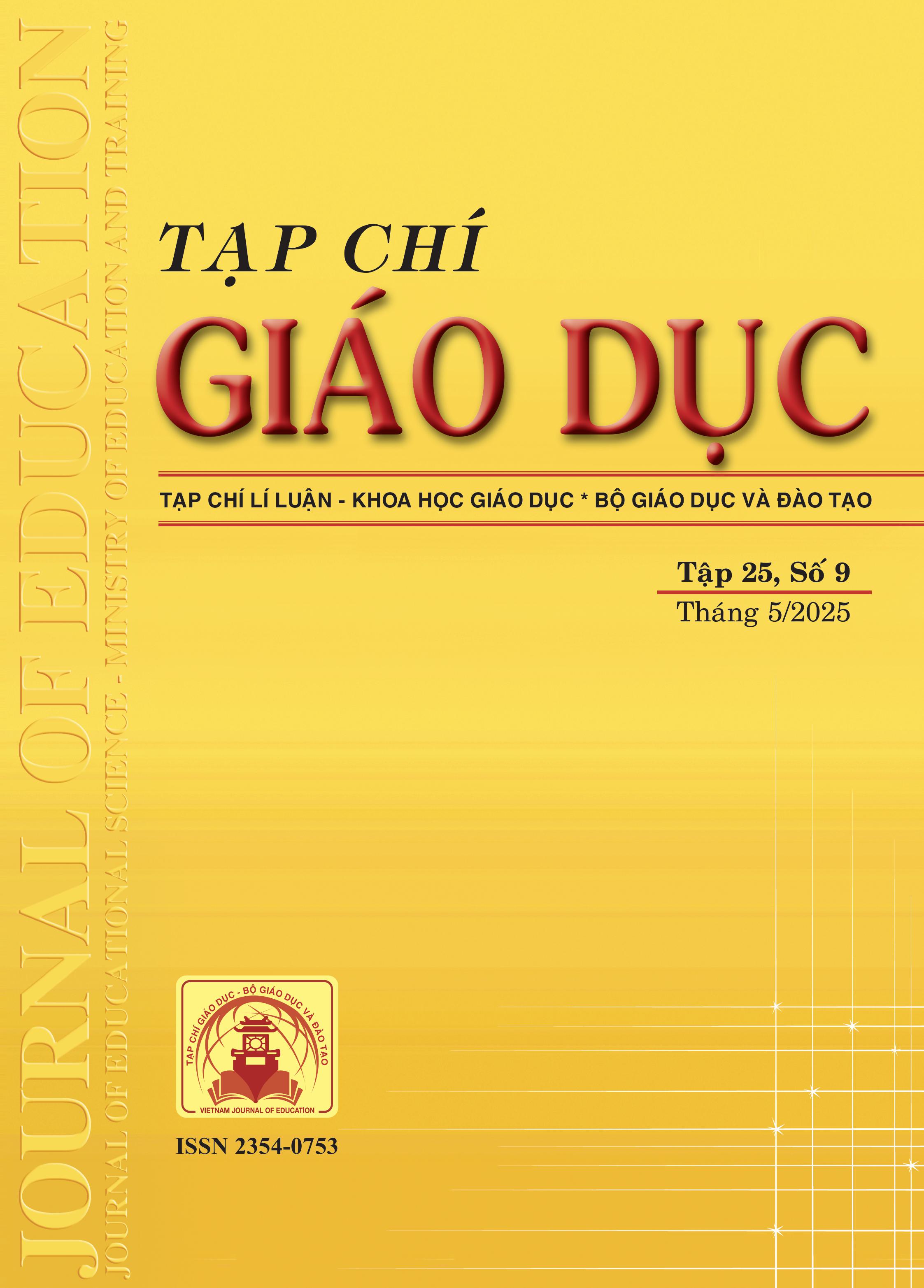Thực trạng gắn kết với công việc của giảng viên ở các trường đại học tự chủ tại Thành phố Hồ Chí Minh
Tóm tắt
This study assesses the current state of lecturers' work engagement in autonomous universities, while also examining disparities in work engagement based on gender, qualifications, and seniority. The research data were collected from 381 lecturers working at autonomous universities in Ho Chi Minh City. The results showed that the lecturers had a higher level of engagement in teaching than in research. Among the components of engagement in teaching and research, the dedication component had the highest mean scores, at 4.41 and 4.04, respectively. These findings help clarify the characteristics of lecturers' work engagement in the context of university autonomy and provide important reference for universities to develop appropriate policies to enhance lecturers' level of work engagement.
Tài liệu tham khảo
Bakker, A. B., & Demerouti, E. (2008). Towards a model of work engagement. Career Development International, 13(3), 209-223. https://doi.org/10.1108/13620430810870476
Brew, A., & Boud, D. (2009). Understanding academics’ engagement with research. Studies in Higher Education, 34(2), 213-229. https://doi.org/10.1080/03075070802656286
Chính phủ (2014). Nghị quyết số 77/NQ-CP ngày 14/10/2014 về thí điểm đổi mới cơ chế hoạt động đối với các cơ sở giáo dục đại học công lập giai đoạn 2014-2017.
Hà Nam Khánh Giao (2016). Các nhân tố tác động đến gắn kết của nhân viên với tổ chức tại Trường Đại học Tài chính - Marketing. Tạp chí Nghiên cứu Tài chính - Marketing, 34, 61-67. https://doi.org/10.31219/osf.io/9pm2v
Han, J., Yin, H., Wang, J., & Bai, Y. (2020). Challenge job demands and job resources to university teacher well-being: The mediation of teacher efficacy. Studies in Higher Education, 45(12), 2347-2362. https://doi.org/10.1080/03075079.2019.1594180
Hồ Thị Thanh Chung (2018). Các yếu tố ảnh hưởng đến ý định nghỉ việc của giảng viên các trường đại học ở Việt Nam. Tạp chí Khoa học, Trường Đại học Đà Lạt, 8(1S), 75-86.
Kahn, W. A. (1990). Psychological conditions of personal engagement and disengagement at work. Academy of Management Journal, 33(4), 692-724. https://doi.org/10.2307/256287
Karimi, S., & Sotoodeh, B. (2020). The mediating role of intrinsic motivation in the relationship between basic psychological needs satisfaction and academic engagement in agriculture students. Teaching in Higher Education, 25(7), 893-909. https://doi.org/10.1080/13562517.2019.1623775
Klassen, R. M., Yerdelen, S., & Durksen, T. L. (2013). Measuring teacher engagement: development of the engaged teachers scale (ETS). Frontline Learning Research, 1(2), 33-52.
Kulikowski, K., Przytuła, S., & Sułkowski, Ł. (2021). The motivation of academics in remote teaching during the Covid-19 pandemic in Polish universities - Opening the debate on a new equilibrium in e-learning. Sustainability, 13(5), 2752. https://doi.org/10.3390/su13052752
Marginson, S. (2018). Global trends in higher education financing: The United States, the United Kingdom, and Australia compared. Journal of Higher Education Policy and Management, 40(2), 105-123. https://doi.org/10.1080/1360080X.2018.1424562
Orazbayeva, B., Davey, T., & Plewa, C. (2020). Engagement of academics in education-driven university-business cooperation: A motivation-based perspective. Studies in Higher Education, 45(11), 2189-2207. https://doi.org/10.1080/03075079.2019.1582013
Oubibi, M., Fute, A., Xiao, W., Sun, B., & Zhou, Y. (2022). Perceived organizational support and career satisfaction among Chinese teachers: The mediation effects of job crafting and work engagement during COVID-19. Sustainability, 14(2), 623. https://doi.org/10.3390/su14020623
Perrotta, D. (2021). Universities and Covid-19 in Argentina: From community engagement to regulation. Studies in Higher Education, 46(2), 207-226. https://doi.org/10.1080/03075079.2020.1859679
Rahman, M. H. A., & Karim, D. N. (2022). Organizational justice and organizational citizenship behavior: The mediating role of work engagement. Heliyon, 8(7), e07381. https://doi.org/10.1016/j.heliyon.2022.e07381
Rothmann, S., & Jordaan, G. M. (2006). Job demands, job resources, burnout, and work engagement of managers at a platinum mine in South Africa. South African Journal of Business Management, 37(1), 49-61. https://doi.org/10.4102/sajbm.v37i1.603
Schaufeli, W. B., Salanova, M., González-Romá, V., & Bakker, A. B. (2002). The measurement of engagement and burnout: A two-sample confirmatory factor analytic approach. Journal of Happiness Studies, 3(1), 71-92. https://doi.org/10.1023/A:1015630930326
Trower, C. A. (2010). A new generation of faculty: Similar core values in a different world. Peer Review, 12(3).
Wang, Y., Derakhshan, A., & Azari Noughabi, M. (2024). The interplay of EFL teachers’ immunity, work engagement, and psychological well-being: Evidence from four Asian countries. Journal of Multilingual and Multicultural Development, 45(8), 3241-3257.
Tải xuống
Đã Xuất bản
Cách trích dẫn
Số
Chuyên mục
Giấy phép

Tác phẩm này được cấp phép theo Ghi nhận tác giả của Creative Commons Giấy phép quốc tế 4.0 .












